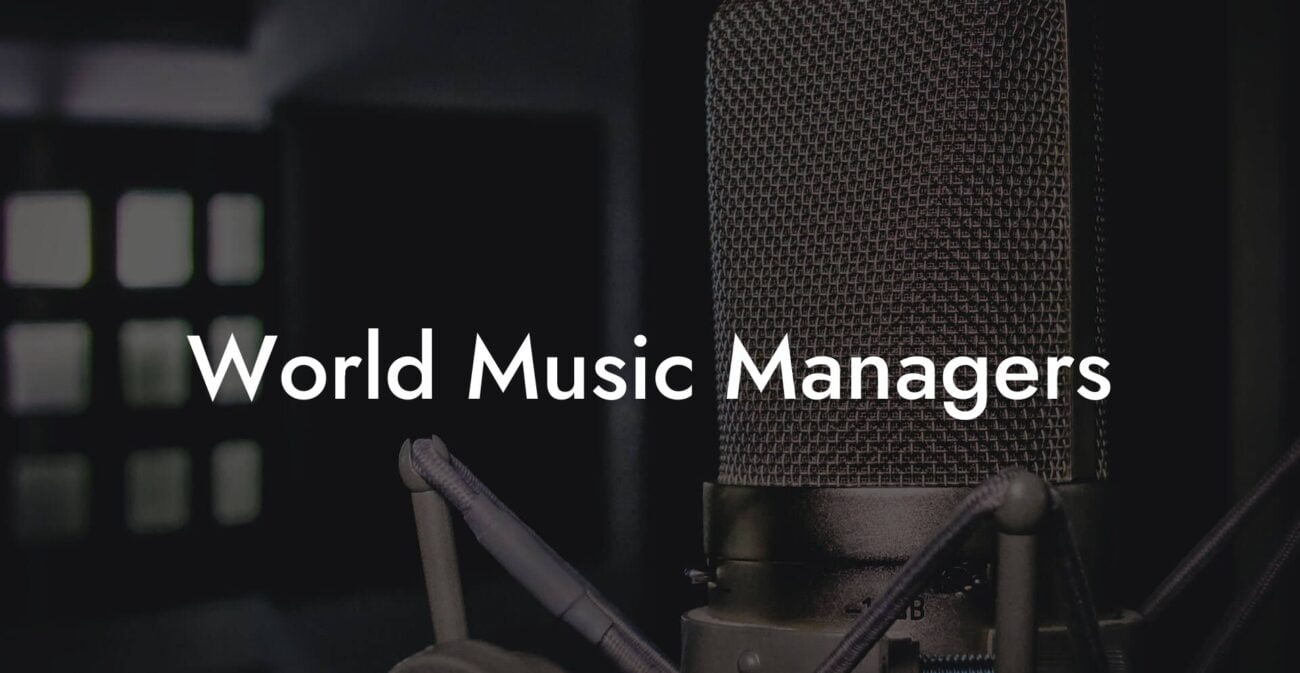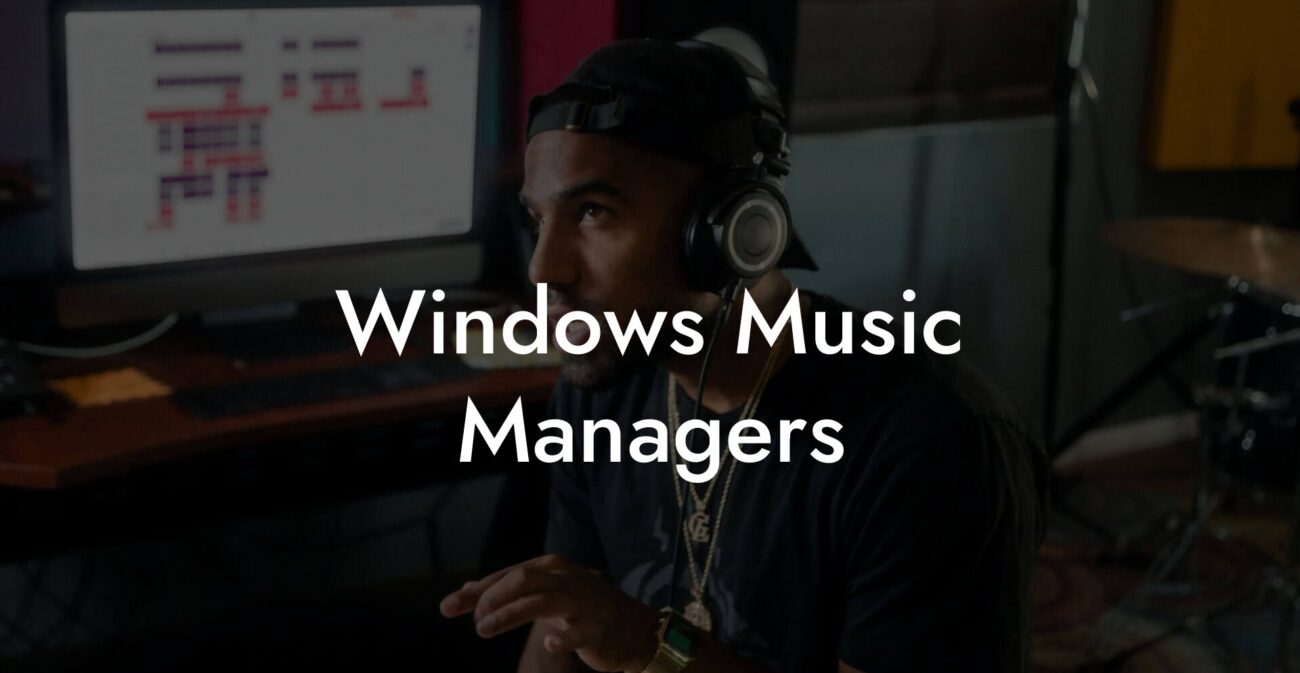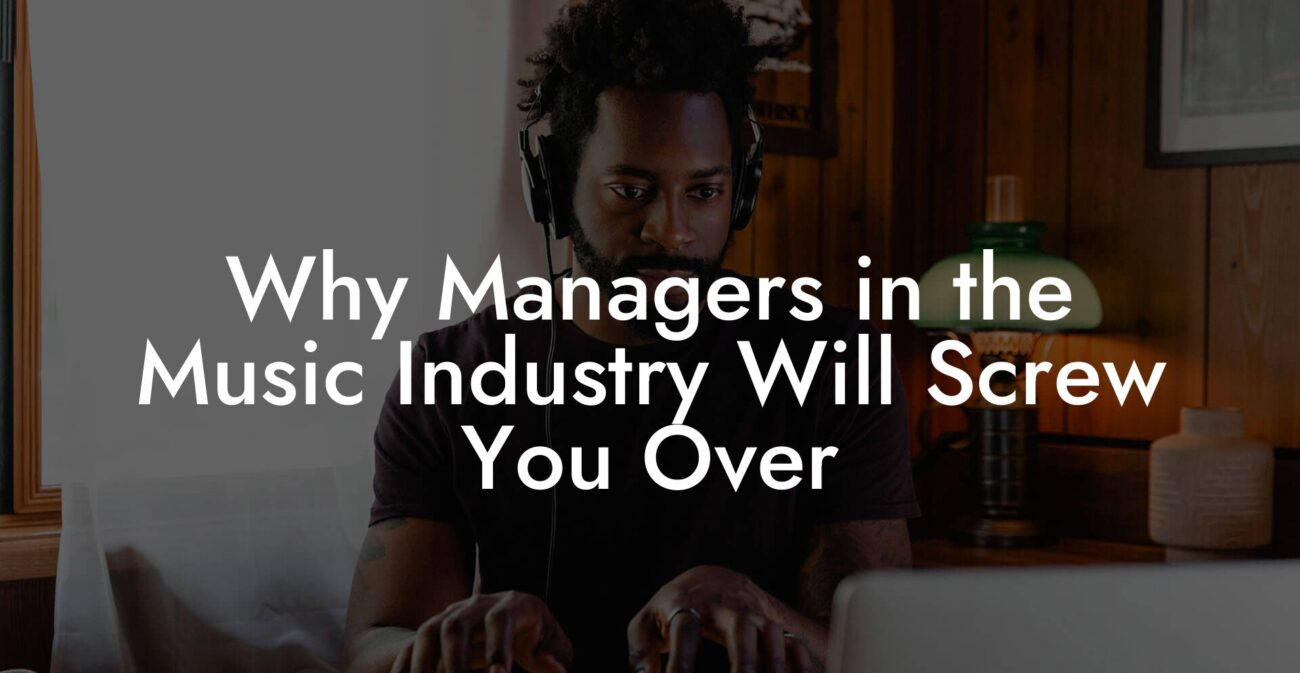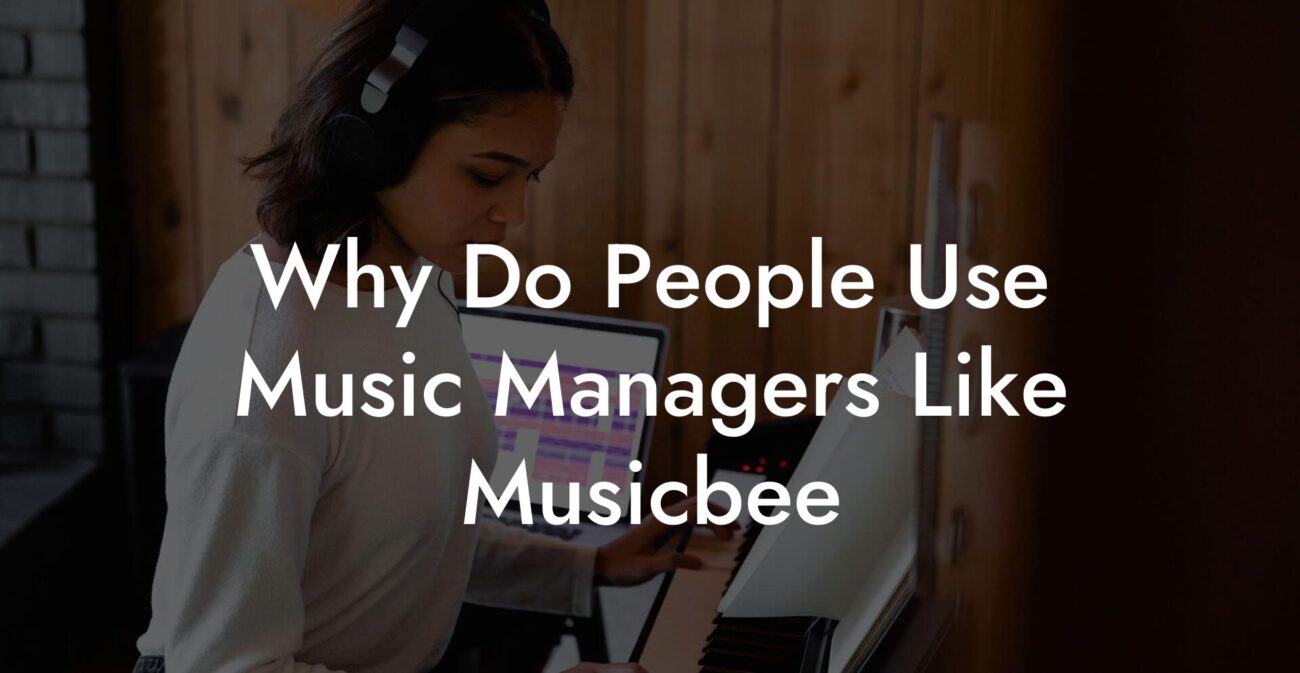Ever wondered how those iconic music managers—yes, the ones who catapult your favorite artists from unknown dreamers to chart-topping superstars—got their start? Grab your headphones, settle in, and prepare for an epic backstage pass into the wild, unpredictable journey that these industry gurus embarked on. Here at Lyric Assistant, we know that crafting the perfect hook matters as much as hustling in the business, and we’re here to share the untold stories, secrets, and street-smart strategies behind the rise of these game-changing figures.
Looking to write your next song? Transform your creative ideas into songs that people will love, and skyrocket your music career with Lyric Assistant. The perfect songwriting assistant. Find out more →
Quick Links to Useful Sections
- The Humble Beginnings: Where It All Started
- The Street Hustle: Internships, Gigs, and DIY Promotions
- Mentorship and Networking: Learning From the Best
- Breaking Boundaries: The Role of Technology and Social Media
- The Business of Music: Mastering the Art of Deal-Making
- The Role of Luck, Timing, and Persistence
- Developing a Personal Brand: The Manager’s Identity
- Overcoming Setbacks: Lessons from the Fall and the Rise
- Embracing the Entrepreneurial Spirit in Music Management
- Resources and Community Support: Your Next Steps
- Mastering the Art of Songwriting as a Music Manager
- Navigating the Ever-Changing Music Industry Landscape
- FAQ: Your Questions on Music Management, Answered
- Your Path to Music Management Mastery
The Humble Beginnings: Where It All Started
In the crazy and ever-evolving realm of music, the journey to becoming a renowned music manager isn’t paved with gold-plated business cards or expensive Ivy League diplomas. Instead, these fearless trailblazers often began with a deep-rooted passion for music, a never-say-die attitude, and sometimes even a busted guitar or two. Many of the famous names in the industry got their start by immersing themselves in local music scenes, hustling at underground gigs, and crafting their own small-scale promotions.
Picture this: a scrappy kid blowing out his savings on a cheap set of speakers, hosting house parties that eventually turned into community events, and networking with local indie bands. This bootstrapped energy gave rise to a generation of managers who weren’t afraid to roll up their sleeves, hustle for every opportunity, and reinvent the music business rules. It’s this blend of raw grit, street smarts, and creative flair that became the secret sauce behind where di famous music managers get their start.
The roots of these success stories don’t lie in expert classes at a top-tier business school; they lie in the very real, everyday experiences of chasing your dreams, making connections at dive bars and open mic nights, and seizing every opportunity to be a part of the magic happening on stage. And guess what? That same resilience and hustle is at the heart of every aspiring musician or songwriter using Lyric Assistant to perfect their lyrics.
The Street Hustle: Internships, Gigs, and DIY Promotions
Before a music manager can guide rockstars to stardom, they often start where every creative hustle begins—on the ground floor. Many famous music managers cut their teeth through internships at record labels or by assisting established managers. These early gigs were less about a cushy office environment and more about absorbing the gritty, behind-the-scenes chaos of the music business.
Internships in the music industry are rarely your typical 9-to-5. They involve long nights staging gigs, coordinating last-minute events, and sometimes even lugging equipment between venues. But for many, these internships were transformative. They were an initiation into a world where every connection, every handshake, and every moment of hustle could mean the difference between being a bystander and an industry insider.
DIY promotions became the canvas on which these future managers painted their early masterpieces. Whether it was designing grassroots marketing campaigns for local bands, hustling social media shout-outs on early Facebook pages, or even creating zine-style flyers by hand, these early experiences taught them one critical lesson: authenticity wins. The street hustle wasn’t about following a blueprint; it was about carving your own unique path, and sometimes that path is paved with passion and a little bit of mischief.
Today, those who began their careers hustling in basements and back alleys are the very people who now steer multi-million-dollar deals and help their artists dominate the charts. Their stories are a testament to the idea that in music—and in life—success is built on sweat, ingenuity, and unapologetic hustle.
Mentorship and Networking: Learning From the Best
In the world of music management, mentors have a pivotal role to play. Aspiring managers often learn from the titans of the industry—not in sterile lecture halls, but at smoky after-hours parties, impromptu jam sessions, and in the heat of a live gig. It’s through these raw, unfiltered interactions that important lessons are passed down: how to negotiate deals, how to read a room, and most importantly, how to believe in the impossible.
The magic of mentorship in this realm lies in its authenticity. While books and courses can provide theories, nothing rivals the wisdom gleaned from real-life experiences shared over a late-night slice of pizza. These mentors taught that every setback is a setup for a comeback, and that your network is your net worth—a mantra that resonates with every budding manager and musician alike.
Networking in the music world isn’t just about swapping business cards. It’s about genuine connections, unexpected collaborations, and a relentless drive to learn from those who’ve weathered the storms of the industry. Whether it’s a seasoned manager offering tips over drinks or a surprising collaboration that sparks at a local gig, these moments of connection are the lifeblood of the music business.
And let’s not forget the digital era’s influence—the rise of social media has turned every aspiring manager into a potential networker with just a click. Instagram DMs, tweetstorms, and LinkedIn connections create a mosaic of relationships that span across the globe. It’s no longer about living in a single city; it’s about tapping into a worldwide community, just like the diverse group of musicians who rely on Lyric Assistant to find inspiration for their next hit.
Breaking Boundaries: The Role of Technology and Social Media
Remember the days when reaching out to that big-shot manager meant mailing a dusty demo tape? Oh, how the game has changed! In today’s digital battleground, technology and social media are the secret weapons in every music manager’s arsenal.
With the rise of platforms like Instagram, TikTok, and Twitter, the ability to spot trends and nurture talent has become as simple as posting a catchy video or story. These platforms have turned everyday enthusiasts into overnight sensations, and the managers who recognized this digital revolution early on now navigate these channels like pros. They’re tapping into real-time data, trends, and the pulse of pop culture to scout for talent and craft innovative promotional strategies.
Digital networking doesn’t just open doors—it sometimes builds the doors. Virtual meetups, online webinars, and digital collaboration tools have all become part of the modern music manager’s toolkit. Gone are the days when talent scouts were confined to certain geographies; today, a breakthrough artist in a small town can become a global sensation overnight, provided they catch the attention of the right manager who knows how to leverage digital platforms.
And speaking of tools, let’s not overlook the importance of smart apps like Lyric Assistant. Just as managers harness the power of digital trends, songwriters use Lyric Assistant to craft lyrics that resonate with audiences worldwide. It’s a classic case of blending art with technology—a synergy that mirrors the very evolution of the music management profession.
The Business of Music: Mastering the Art of Deal-Making
Beyond the gigs and late-night brainstorming sessions, music management is, at its core, a sophisticated business. Aspiring managers must navigate the intricacies of contracts, copyright laws, marketing strategies, and financial management—all while keeping the creative spirit alive.
Many of those who eventually make it big initially found themselves buried under piles of paperwork and back-to-back negotiations. But this legal labyrinth also provided them with an insider’s view of how the business operates. Learning the nuances of a good record deal or a smart licensing agreement is as essential as understanding the creative process behind songwriting.
For many up-and-coming managers, formal education or a background in business might not have been part of the equation. Instead, they learned on the job—absorbing lessons in negotiation, contract law, and business strategy from every missed beat and every contract signed on a napkin. These early lessons in deal-making often came with a side of humor, as they navigated the absurdities and quirks of the music industry with a wry smile.
It’s all about balancing the artistic with the pragmatic. While the creative spark is the lifeblood of music, the ability to strike a lucrative deal often determines whether that spark turns into a roaring flame. And, much like writing lyrics that resonate, mastering this balance requires a mix of intuition, calculated risk-taking, and a dash of street wisdom.
The Role of Luck, Timing, and Persistence
Let’s take a moment to talk about the elusive trifecta that powers every success story in the music industry: luck, timing, and persistence. Many famous music managers will tell you that sometimes being in the right place at the right time can be as important as hard work and strategic planning.
The unpredictable nature of the music industry means that serendipity often plays a significant role. A chance encounter at a local open mic night, a surprising recommendation from a band member, or even a viral social media post can be the catalyst that sends a career skyrocketing. These moments of serendipity are fueled by persistence—by showing up, by taking risks, and by constantly believing in the vision, even when the odds seem stacked against you.
But make no mistake—luck favors those who are prepared. It’s not enough to simply wish for a breakthrough; you have to be in motion. Many of the managers who made a name for themselves spent years honing their craft, learning from every setback, and relentlessly pursuing their goals. And if there’s one lesson to take away, it’s that the combination of hard work, audacity, and a sprinkle of luck can lead to extraordinary results.
In our fast-paced, unpredictable world, where trends shift in the blink of an eye, the vibe remains the same: keep pushing, be adaptive, and trust that every small step is part of the larger journey toward music management greatness.
Developing a Personal Brand: The Manager’s Identity
It’s not just about the artists—music managers need to develop their own signature style and identity. In a competitive industry, establishing a personal brand can set you apart from the crowd. Your brand is a reflection of your personality, your values, and your approach to business.
For many famous managers, their brand was built organically over years of hustle and authentic storytelling. Whether it was an irreverent sense of humor or an unyielding dedication to the underdog, your unique identity can resonate deeply within the music community. This personal brand becomes a beacon for artists, signaling a kindred spirit who not only understands the industry but also knows how to navigate its exhilarating twists and turns.
Building a personal brand starts with being genuine. Share your journey, your failures, and your successes on social media, in interviews, or even through blog posts. The more you showcase your authentic self, the more you connect with the industry’s dreamers and doers. And as your reputation grows, so does your network—both critical ingredients for career longevity.
Think of your brand as your unique loudspeaker in a sea of noise. When you speak from the heart and remain true to your vision, you create an aura of reliability and coolness that attracts the right opportunities. Much like how aspiring songwriters lean on Lyric Assistant to amplify their lyrical prowess, a well-crafted personal brand can amplify your professional journey.
Overcoming Setbacks: Lessons from the Fall and the Rise
No epic journey is complete without a few bumps along the road. For every music manager who climbs to the top, there are countless stories of missed opportunities, contract disputes, and unexpected setbacks. Yet, each of these obstacles served as a powerful lesson and a stepping stone toward future success.
In the unpredictable world of music, failure is not a dead end—it’s a redirection, a learning curve, and a moment for introspection. Many future industry leaders recounted how their early missteps taught them resilience, innovation, and the importance of staying grounded. Far from being a badge of shame, these setbacks became rallying cries that spurred them on to greater achievements.
The art of bouncing back is something every entrepreneur and music enthusiast can relate to. Whether it’s a cancelled tour, a failed album launch, or a contract that fell through at the last minute, the key is to keep moving forward. With every setback comes the opportunity to refine your vision, restructure your strategy, and ultimately emerge stronger.
So if you’re a budding manager or an artist navigating your path in the music business, remember this: every stumble is a setup for an even greater comeback. Embrace your failures with the same passion as your successes, keep learning, and never lose sight of that spark that first ignited your love for music.
Embracing the Entrepreneurial Spirit in Music Management
Beyond the glitz, glamour, and celebrity encounters, music management is a raw, entrepreneurial endeavor. Think of it as a startup where every day is a new pitch meeting, every gig is a product launch, and every networking event is a potential breakout moment.
Many music managers started out not as polished executives, but as scrappy entrepreneurs willing to take risks. They operated on shoestring budgets, dove headfirst into creative marketing strategies, and weren’t afraid to innovate. From bootstrapping their own brands to experimenting with unconventional promotions, these managers redefined what it means to run a business in the music scene.
The entrepreneurial mindset infuses every aspect of the journey: making bold decisions, taking calculated risks, and learning from every win and loss. It involves building a brand from scratch, harnessing the power of digital platforms to amplify your message, and always pushing the envelope. This is especially true in our era, where the rules of the game are constantly evolving, and success often belongs to those who dare to innovate.
As a musician or aspiring manager, channeling that entrepreneurial energy can transform obstacles into opportunities. It’s about leveraging every resource available—be it online tools like Lyric Assistant for perfecting your craft or the massive reach of social media to promote your vision. In the grand symphony of the music industry, the entrepreneurial spirit is the rhythm that keeps the beat going.
Resources and Community Support: Your Next Steps
If you’re feeling inspired and itching to jump into the chaotic, exhilarating world of music management, you’re not alone. There’s a whole community of like-minded individuals—managers, artists, songwriters, and industry gurus—ready to share tips, resources, and support.
First off, immerse yourself in online music communities, forums, and social media groups where the latest industry trends are discussed daily. Sites like SoundCloud, Bandcamp, and even LinkedIn groups can provide invaluable insights and networking opportunities. Don’t underestimate the power of a connection or two; sometimes a casual conversation online can lead to a breakthrough collaboration or mentorship opportunity.
Next, take advantage of the vast library of resources available online—whether it’s articles, podcasts, or video tutorials on music management, marketing strategies, or negotiation tips. Look for webinars and digital workshops led by established professionals who share their real-world experiences and insider secrets.
And as you sharpen your business acumen, don’t forget to nurture your creative side. Aspiring to be both a savvy manager and an artist means you understand the delicate balance between business and creativity. Leverage tools like Lyric Assistant not only to elevate your songwriting but also to refine your pitch materials and artist development strategies. It really is a win-win, blending the art of words with the business of beats.
Finally, consider joining local music meet-ups or industry events—these are prime opportunities to network, learn, and grow. Not sure where to start? Check out platforms like Meetup or Eventbrite for music industry events in your area. Remember, your growth in this industry doesn’t happen in isolation; it’s built on community support, shared ideas, and constant collaboration.
So, take the plunge. Equip yourself with knowledge, build your network, and start crafting your own story in the vibrant realm of music management. With every new connection and every new insight, you’re not just advancing your career—you’re contributing to a legacy that inspires the next generation of industry trailblazers.
Mastering the Art of Songwriting as a Music Manager
You might be thinking, “Wait a minute, I thought music managers were all about contracts and meetings.” Well, here’s the twist: many of today’s successful managers wear multiple hats, including that of a storyteller. Understanding songwriting isn’t just for the artists—it can be a superpower in a manager’s arsenal. After all, when you truly grasp what makes a lyric resonate, you’re better equipped to nurture your artists’ creativity.
At Lyric Assistant, we see firsthand how musicians harness their inner wordsmiths to transform simple phrases into heart-thumping anthems. As a manager, knowing the intricacies of lyrical composition can help you collaborate more effectively with your artists, offer genuine feedback, and even spot potential hits before they climb the charts. It opens up creative dialogues where business converges with art, enhancing your overall strategy in talent development.
Combining a deep understanding of music and lyrics with solid management strategies creates an unbeatable formula. It’s like having your cake and eating it too—ensuring that both the creative process and the business logistics work in harmony. So don’t shy away from exploring songwriting techniques, attending lyric workshops, or even experimenting with your own pen and paper. In the grand scheme of things, the more you understand the craft, the better you can champion the voices of tomorrow.
Navigating the Ever-Changing Music Industry Landscape
The music industry, much like the latest TikTok trend, is in a constant state of evolution. What worked five years ago might not cut it today. That’s why the journey to becoming a top-tier music manager is an ongoing education in adaptability, innovation, and a keen sense of timing.
With shifts in consumer habits, technological advances, and changes in how we consume media, music managers must remain agile. Today’s landscape is dominated by streaming platforms, viral challenges, and data analytics. Embracing these changes means staying ahead of the curve—experimenting with fresh marketing approaches, constantly refining promotional tactics, and even reconsidering traditional revenue models.
Just as artists evolve and adapt their sound, successful managers continuously reinvent their strategies. They monitor trends on social media, track performance metrics, and even pivot when necessary to align with the ever-changing rhythms of the industry. This relentless drive for evolution is what sets apart those who merely survive from those who thrive.
The takeaway? In a dynamic field like music management, learning is perpetual. Each new trend or technological breakthrough can herald a wave of opportunity—and with each change, there’s a chance to innovate and leave your mark on the industry.
FAQ: Your Questions on Music Management, Answered
Whether you’re an aspiring manager or just curious about the path to music industry success, here are some of the questions we get asked most often:
1. How do famous music managers typically get their start?
Many started from grassroots gigs, internships, and DIY promotions, often learning on the job and building authentic connections in the local music scene.
2. Do I need a formal degree in business or music to succeed?
Not necessarily. While formal education helps, real-world experience, networking, and passion for music can be just as crucial for breaking into the industry.
3. What role does social media play in modern music management?
Social media is vital, as it allows managers to scout talent, build networks, and promote artists directly. It’s an essential tool for staying relevant and tapping into global trends.
4. Can learning about songwriting help me become a better manager?
Absolutely! A solid understanding of songwriting can help you give creative feedback, nurture talent, and ultimately guide your artists toward creating authentic music that resonates.
5. How important is mentorship in the career of a music manager?
Extremely important. Mentorship provides real-world insights, practical advice, and invaluable networking opportunities that can fast-track your journey in the music industry.
6. Where can I start building my network in the music industry?
Begin by attending local gigs, joining online music communities, and participating in industry events. Platforms like LinkedIn, Instagram, and even niche music forums are great starting points.
7. How does Lyric Assistant help both musicians and managers?
Lyric Assistant empowers musicians by simplifying the creative process, and it gives managers insight into the creative side of songwriting, fostering better collaboration and talent development.
Keep these questions in mind as you chart your path in the wild world of music management. Every question answered is one step closer to mastering the craft.
Your Path to Music Management Mastery
If you were inspired by these real-life stories, hustle strategies, and insider secrets, know that your journey in music management is just beginning. With passion as your compass and creativity lighting the way, every gig, every networking event, and every late-night brainstorming session brings you closer to carving out your niche in this dynamic industry.
Embrace the grind, cherish every setback as a lesson, and celebrate the small victories along the way. Remember that every music manager started exactly where you are now—breaking through the noise, learning on the fly, and seizing every opportunity to make their mark.
Just as a talented songwriter relies on Lyric Assistant to bring the perfect verse to life, your unique vision and infectious passion can transform the raw energy of local gigs into a symphony of success. So, dare to dream big, hustle harder, and craft your legend in the ever-evolving story of the music industry.
Whether you ultimately guide artists to become household names or revolutionize how music is managed, your journey matters. With every step, you’re not only reshaping your own destiny but also inspiring a new generation of dreamers who believe that the magic of music starts with a spark of passion and endless creativity.
The backstage is waiting, the stage is set, and the world is listening. Your path to music management mastery begins now—seize the moment, and let your journey echo as loudly as the beats of your favorite track.














